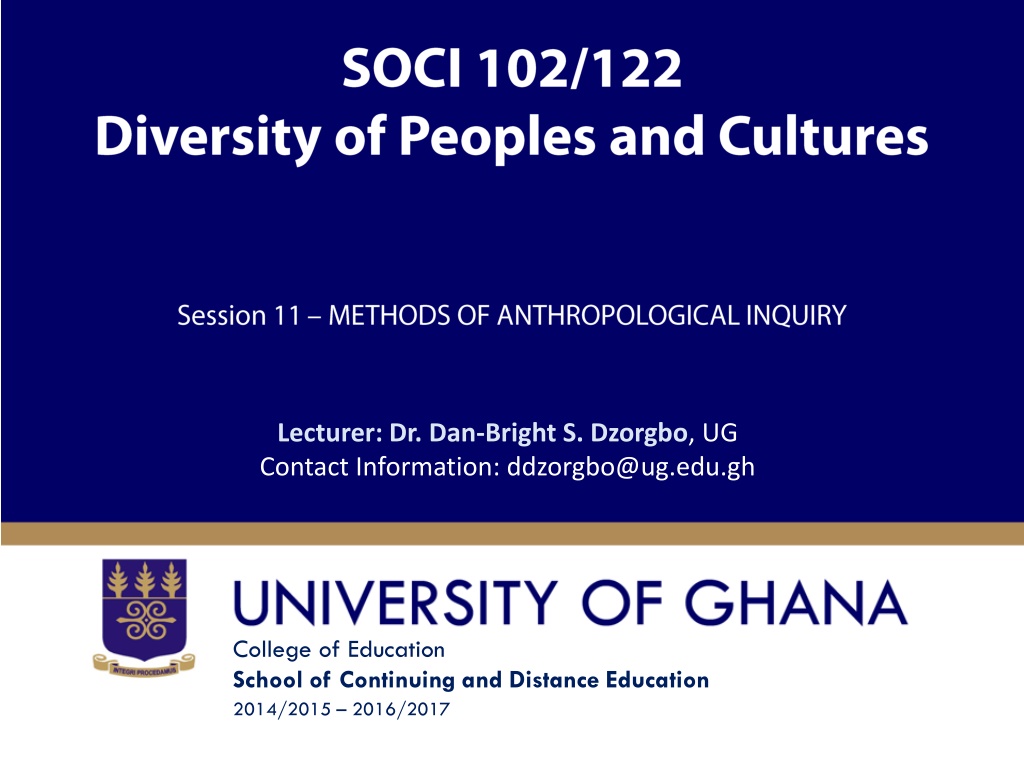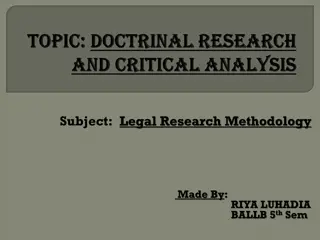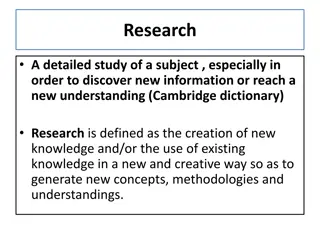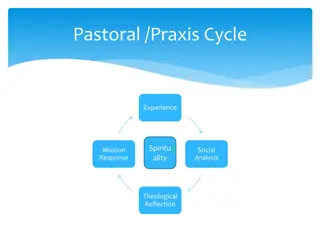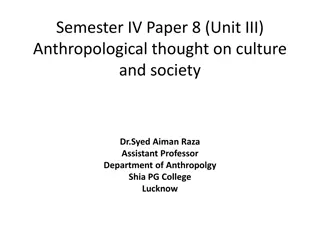Methods of Anthropological Inquiry and Research Overview
The course on Diversity of Peoples and Cultures introduces students to Social Anthropology. The session covers the importance of ethical considerations in studying various cultures, methods used by anthropologists, and the objectives of cultural research. Key topics include anthropological approaches, fieldwork, data gathering methods, and cultural analysis. Recommended readings provide additional insights into human diversity.
Download Presentation

Please find below an Image/Link to download the presentation.
The content on the website is provided AS IS for your information and personal use only. It may not be sold, licensed, or shared on other websites without obtaining consent from the author. Download presentation by click this link. If you encounter any issues during the download, it is possible that the publisher has removed the file from their server.
E N D
Presentation Transcript
Lecturer: Dr. Dan-Bright S. Dzorgbo, UG Contact Information: ddzorgbo@ug.edu.gh College of Education School of Continuing and Distance Education 2014/2015 2016/2017
Session Overview Introduction In one sense the course Diversity of Peoples and Cultures can be regarded an introduction to a sub-discipline of Sociology called Social Anthropology, also known as Cultural Anthropology. Therefore, in this final two sessions we want to introduce you to Methods of Anthropological Inquiry. There are many methods which anthropologists use to study different cultures, communities and societies. In studying other peoples who are usually not part of us and our world, we must make sure that we respect them and their views; we don t violate their world, their sacred places; we tell the truth about them, we protect them from harm, and we leave them with goodwill that others can also come and study them.These considerations are captured under the term ethical issues. As researchers we need to understand these issues. Goals and Objectives At the end of the session, the student will be able to: explain why cultural anthropologists (American) or social anthropologists (British) and indeed social scientists have to conduct research what specific methods cultural and social anthropologists adopt in the field Slide 2 Dr. Dan-Bright S. Dzorgbo, Sociology Dept. UG
Session Outline The key topics to be covered in the session are as follows: Topic One: Social and Cultural Anthropologists and Research Topic Two : The Field Work Topic Three: Methods of Gathering Data in the Field Topic Four: Anthropological Approaches to Analyzing Culture Slide 3 Dr. Dan-Bright S. Dzorgbo, Sociology Dept. UG
Reading List Assimeng, M. (1999), Social Structure of Ghana, Tema, Ghana Publishing Corporation. Kottak, C. P. (2004), Cultural Anthropology, Boston, McGraw Hill Corporation. Kottak, C. P. (2004), Anthropology: The Exploration of Human Diversity, Boston, McGraw Hill Corporation. Nolan, P. & G. Lenski, (2004 or any of the newer editions), Human Societies: An introduction to macrosociology, Boulder Paradigm Publishers. Nukunya, G. K. (2006), Tradition and change in Ghana: An introduction to sociology, Accra, Ghana University Press. Sanderson, S. K. & A. S. Alderson (2005 or its newer editions), World societies: the evolution of human life, Boston, Pearson Education Inc. Slide 4 Dr. Dan-Bright S. Dzorgbo, Sociology Dept. UG
Topic One: Social and Cultural Anthropologists and Research Research on other people and cultures is a central activity of all cultural or social anthropologists In order to understand how diversify peoples and cultures are, it is important to have fieldwork through which researchers studies in detail holistically and comparatively different peoples and cultures. Because they have traditionally been interested in earlier forms of society, that is, simple or traditional societies, social and cultural anthropologists have built distinctive research methods. These methods are mainly fieldwork and the comparative method. In recent times, however, they also do surveys as they enter into the study of modern and large-scale societies, including urban environments. It is also important that the studies are compared cross-culturally to bring similarities and differences . Slide 5 Dr. Dan-Bright S. Dzorgbo, Sociology Dept. UG
Topic Two: The Fieldwork The Fieldwork is the basic tool anthropologists irrespective of specializations, employ to undertake their studies. Fieldwork is a study that involves firsthand detailed observation, in a natural setting of whatever is under investigation: people and cultures, etc. Because of this, field work takes a relatively long time to accomplish. Traditionally, anthropological researchers spend many years on the field two to four years on the field, learning the languages and cultures of the people to be able to communicate and understand them firsthand. The report from such detailed investigation is called an ethnography and the researchers are called ethnographers. Fieldwork also involves cross-cultural comparison: that is, the examination of the varied ways in which some aspect of human life or culture of a people under investigation is viewed or treated in other cultures Slide 6 Dr. Dan-Bright S. Dzorgbo, Sociology Dept. UG
Topic Three: Methods of Gathering Data in the Field The specific methods for gathering data during the fieldwork include: Observation Participant Observation Conversation Interviewing Slide 7 Dr. Dan-Bright S. Dzorgbo, Sociology Dept. UG
Topic Three: Methods of Gathering Data in the Field Survey Research (cont d) The other methods for gathering data in the field are: Genealogical Method Life Histories Key Cultural Consultants Longitudinal Research Slide 8 Dr. Dan-Bright S. Dzorgbo, Sociology Dept. UG
Topic Four: Anthropological Approaches to Analyzing Culture The main goal of the ethnographer is to discover and describe local beliefs and perceptions of other societies. In this endeavour, the researcher analyzes his or her study from two comparative angles. The etic and emic perspectives Etic perspective: This is the research approach in which the ethnographer s rather than the locals explanations, categories and criteria, are used for analyzing the culture and life of the people being studied (etic: the scientist s perspective) Emic perspective: This is the opposite of the Etic perspective. It is the research approach that focuses on the interpretations, explanations and criteria of the local people (the local people s perspective). Slide 9 Dr. Dan-Bright S. Dzorgbo, Sociology Dept. UG
Conclusion In this session you have: Learnt about the importance of research in other cultures to social and cultural anthropologists; Learnt about the Field Work as the main research approach of these scientists; Leant a wide range of methods of gathering data in the field Distinguish between emic and etic perspectives for analyzing and interpreting cultures and practices Slide 10 Dr. Dan-Bright S. Dzorgbo, Sociology Dept. UG
